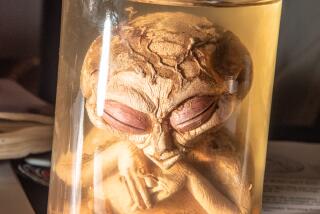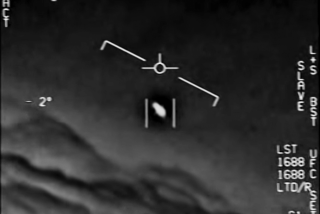Light Years From Being Fair
- Share via
Philip J. Klass’ review of my book “Light Years” (The Book Review, June 7) was unfair to me as an author and unfair to your readers who deserve unbiased reporting. Unfortunately, few of your readers know that for 20 years Klass has conducted a one-man campaign intent on proving that anyone who claims to have seen something unexplainable in the sky is either mentally deficient or lying for profit; he has published at least three books and made hundreds of public appearances trying to debunk UFOs.
He writes: “. . . it was the beautiful color photos of saucer-shaped objects that Kinder found so convincing.” The photographs are impressive, but I have never said anywhere that Eduard Meier’s collection of photos is the evidence I found “so convincing.” I have stated that the metal sample examined in IBM laboratories convinced me that Meier’s story was no ordinary claim of contact. Marcel Vogel, an IBM scientist for 22 years and holder of 32 patents, analyzed the fragment under a $250,000 microscope and concluded, “With any technology that I know of, we could not achieve this on this planet.” In keeping with his reputation, Klass fails even to mention the metal sample or its analysis in his review.
Next, he avoids the findings I cited of the two top-flight scientists who examined the Meier photographs--Michael Malin at Arizona State University and Eric Eliason at the U.S. Geological Survey. After computer analysis, Malin states in the book, “I find the photographs themselves credible. They’re good photographs. They appear to represent real phenomena.” Eliason says, “One conclusion I made was that (the image) certainly hadn’t been dubbed in. There was just a natural transition.” Shouldn’t the reader be apprised of such conclusions?
Then Klass ignores the two sound engineers who analyzed a recording that Meier claimed was of a “beamship” and concluded, “This was a single, sole source recording that had an amazing frequency response. If it is a hoax, I’d like to meet the guy who did it, because he could probably make a lot of money in special effects.”
Klass never tells the reader that the Swiss farmer, Meier, is a one-armed man with a 6th-grade education. Nor does Klass mention David Froning, the astronautical engineer with 25 years experience at McDonnell Douglas, who puzzled over the accuracy of Meier’s figures concerning faster-than-light travel. “I think it would be very improbable for someone with Meier’s educational background to hit on this combination of figures and have them be within a scientifically acceptable range,” says Froning in the book. “I’ve only discussed this Meier case with scientists who are fairly open-minded about interstellar flight, but I’ll tell you, the majority of them think it’s credible.”
Why is Klass allowed to ignore such statements that are so crucial to the story he is reviewing?
In writing “Light Years” I took great care to remain objective. After completing the final draft of the manuscript I mailed to each of the scientists a packet which included everything in the manuscript pertaining to him. I asked that each make any corrections, technical or otherwise, he cared to make. Everything concerning the s1667851630in “Light Years” exactly as the scientists authorized it to appear. After receiving his packet, Malin wrote to me, “It is a credit to your writing that I cannot tell whether you are a supporter or a detractor.” Eliason replied, “Thank you for the accurate representation of my views on the Meier UFO photographs.” Klass seems incapable of such objectivity.
Most people who have the opportunity to appear with Klass on any panel or talk show refuse because he refuses to address facts. In his review he refers to a Seattle talk show on which he and I appeared, but he fails to mention that the audience booed him for refusing to confine his comments to the issues. To assign a review of “Light Years” to Phil Klass, who has such a large ax to grind, taints the credibility of your publication as a provider of fair and impartial appraisals of literary material. I only wish that half the readers exposed to Klass’s vindictive review also read letters to the editor.
GARY KINDER
Sun Valley, Ida.
More to Read
Sign up for our Book Club newsletter
Get the latest news, events and more from the Los Angeles Times Book Club, and help us get L.A. reading and talking.
You may occasionally receive promotional content from the Los Angeles Times.








